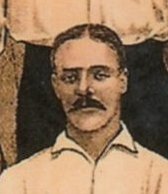Related Research Articles

Segar Richard Bastard was an English amateur association football player and referee born in Chigwell, Essex. He played football on an amateur basis for three clubs as well as playing for England once. He was also an international referee and was held in high regard throughout English football. Bastard also played county cricket for Essex County Cricket Club and Marylebone Cricket Club and was a solicitor by profession.
The following are events in the 1850s decade which are relevant to the development of association football. Included are events in closely related codes, such as the Sheffield Rules. All events happened in English football unless specified otherwise.

John Goodall was a Scotch Professor footballer who rose to fame as a centre forward for England and for Preston North End at the time of the development of the Football League, and also became Watford's first manager in 1903. He also played cricket in the County Championship for Derbyshire in 1895 and 1896, being one of 19 players to achieve the Derbyshire Double of playing cricket for Derbyshire and football for Derby County. He was also a curling player of some repute.

James Henry Forrest was an English footballer whose career spanned the transition from amateurism to professionalism in English football in the 1880s and 1890s. He played most of his club career for Blackburn Rovers, whose early embracing of professionalism enabled them to become one of the major teams in English football, and with whom he appeared on the winning side in five FA Cup finals. He was the first professional player to appear for England for whom he made eleven appearances, as a half-back.

William Gwynn was a Welsh international rugby union forward who played club rugby for Swansea and would later become secretary of the Welsh Rugby Union. Gwynn was an all-round sportsman and as well as his success on the rugby pitch he also player cricket for Swansea, of which he became vice-president, and Glamorgan. Gwynn had also played association football and had captained Battersea College XI through two undefeated seasons. He would later become a referee and would officiate the very first football game between Swansea Town and Cardiff City.

Charlie Henry Newman was a Welsh international three-quarter who played club rugby for Newport. He was awarded ten caps for Wales and captained the team on six occasions. An original member of the Newport squad he captained the team in the 1882/83 season.
John Sidney Smith was an English-born international rugby union forward who played club rugby for Cardiff Rugby Football Club and international rugby for Wales.

William Edward Maclagan was a Scottish international rugby union forward who played club rugby for London Scottish F.C. Maclagan was one of the longest-serving international rugby players during the early development of the sport, and was awarded 25 caps for Scotland.
Andrew Ramsay "Bunny" Don-Wauchope was a Scottish international rugby union back who played club rugby for Cambridge and Fettesian-Lorettonian. Don Wauchope played an important role within the early growth of Scottish rugby and after retiring from international rugby he became a referee and was the President of the Scottish Rugby Union. He was considered Scotland's outstanding half-back of the early 1880s and is credited as being one of the pioneers of modern half-back play.
Clopton Allen Lloyd-Jones was an English businessman and amateur sportsman, best known for football and cricket. He played for the Clapham Rovers when they won the FA Cup in 1880 and was selected, but did not play, for Wales as an international.

Dr. Lennard Stokes was a rugby union international who represented England from 1875 to 1881. He also captained his country on five occasions, notably in the first ever match against Wales. Like his brother Frederick Stokes, after captaining his country he went on to become the president of the Rugby Football Union.
John Jones was a Welsh amateur footballer who spent most of his football career with Druids, and played for the Wales national football team in their first international match in 1876.
William Williams was a Welsh amateur footballer who played most of his football career with the Druids club of Ruabon. Generally playing at half-back, he made eleven appearances for Wales between 1876 and 1883.
William Roberts was a Welsh footballer who played as a forward in the 1870s and 1880s and made six appearances for Wales, scoring twice.

George Gillespie was a Scottish footballer who played for Rangers (1876–1883), Queen's Park (1884–1892) and Scotland in the late 19th century.
Edward Bowen was a Welsh footballer. He was part of the Wales national football team between 1880 and 1883, playing 2 matches. He played his first match on 27 March 1880 against Scotland and his last match on 12 March 1883 against Scotland. At club level, he played for Druids.
Albert Jones was a Welsh international footballer. He was part of the Wales national football team between 1884 and 1885, playing 4 matches and scoring 2 goals. He played his first match on 9 February 1884 against Ireland and his last match on 23 March 1885 against Scotland.
Frederick Jones was a Welsh international footballer. He was part of the Wales national football team between 1885 and 1886, playing 3 matches. He played his first match on 14 March 1885 against England and his last match on 10 April 1886 against Scotland.
Thomas Lewis was a Welsh international footballer. He was part of the Wales national football team, playing 2 matches. He played his first match on 26 February 1881 against England and his last match on 14 March 1881 against Scotland.
George Thomas was a Welsh international footballer. He was part of the Wales national football team, playing 2 matches. He played his first match on 14 March 1885 against England and his last match on 23 March 1885 against Scotland. At club level, he played for Wrexham Olympic.
References
- ↑ "Wales player database 1872 to 2013". eu-football.info. Retrieved 30 April 2016.